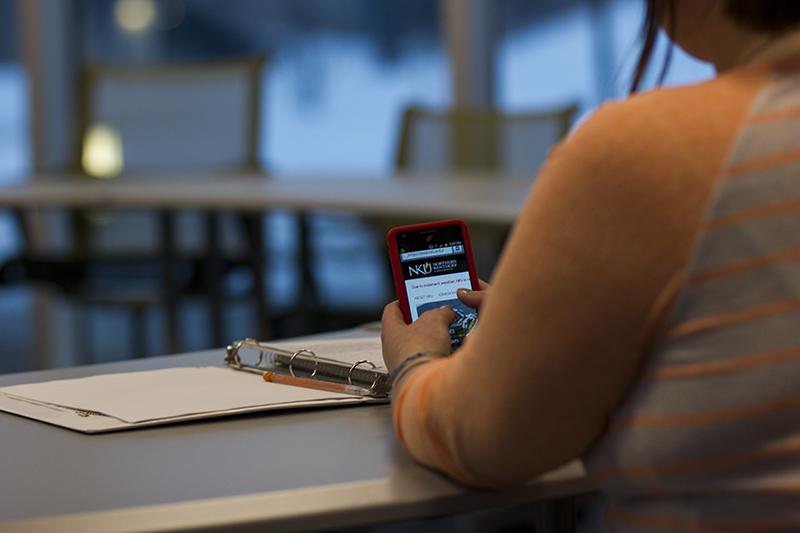Smartphones may enhance classroom discussions
Some professors encourage cell phones being used in class if it relates to the course or improves class discussion.
Cell phones have spread their influence in almost every field, including higher education. Like any other technology, cell phones hold great potential for communicating and finding information.
But while this has opened up doors in many areas, many say it has created problems in the classroom.
Some professors feel that the only way to keep students engaged in class is by banning phones, but others at NKU see cell phones as possible tools to enhance the lecture.
Professor Rudy Garns of Sociology, Anthropology and Philosophy said that many of his students have asked about his policy of using cell phones during class.
“More and more students are asking me, I think [because] other professors have policies…I say I’m fine with electronics as long as you’re not interrupting class,” he said.
Dr. Jennifer Cellio, director of the Writing Instruction Program, said she doesn’t have much of a problem with cell phone use in the classroom.
“I think students recognize that I’m treating them as adults, but also understand that we’re going to be doing things and I don’t want them on their phones,” Cellio said.
Many professors don’t have a problem with students having their cell phones out in class mainly because of its capability for containing or accessing information. For example, iPhones contain notepads, calendars, Internet access and the ability to record sound, pictures and video. These applications have multiplied the possibilities for distraction, but they are also good tools for professors to embrace as part of class discussion.
Smart phones allow students to record the lecture so they can access it later when they want to study. Students can record using audio or video to remember what was discussed in class, or they can take pictures of drawings on the board to use as a reference later.
Not only do smart phones allow students to record a lecture, they also allow them to contribute to or even enhance the discussion. Smart phones allow students to look up a vocabulary word or concept if they are unsure of its meaning, which can help keep the pace of the class going.
Dr. John Alberti, director of Graduate Studies in English, said, “Raising your hand is a big commitment. It’s going to stop the class and then you’ll have to decide, ‘do I want to admit that I don’t know what this means.’”
Dr. Cellio said that students looking up information on their own helps to keep the discussion moving.
“[Students] are invited to use their phones,” she said. “It’s the same approach as if I was doing it on my computer, but it’s quicker and it helps students practice gathering information using their devices, which I think is… a way to make technology a use in the classroom.”
Dr. Alberti agrees, saying, “I think that’s a really good habit; let’s all access information.”
Garns said when students look up information on their phone it adds to the discussion.
“We can talk critically about whether or not it’s good information or bad information,” he said. “It’s a nice starter for conversations.”
Dr. Alberti added that he likes to have several sources that are brought into the class discussion, and students pulling up information on their phones accomplishes this.
“I like having lots of sources,” he said. “I would hate to discourage students from doing that. This can be a great reference source, and it can also be that the lecture is really boring.”
The discussion over phones in class comes down to one thing, students want to be engaged in the classroom, according to Alberti.
“Students still are looking for classroom discussions that are engaging and interesting,” he said. “[They] would rather be learning than not learning.”
Alberti said that it is partly the professor’s responsibility to make sure students are learning and engaged in the classroom; he added that if our brain gets bored, it will always find something to engage with.
He added that for the most part, students are not using their phones in class because they’re glued to the screen. “Students’ drive is not, ‘I want to be doing something with my phone. It’s, ‘I want to be doing something interesting.’”


